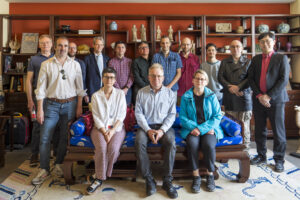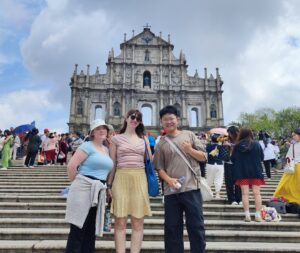It’s been a crazy couple of weeks for our students here at TBC. Despite just having handed in a bunch of midterm papers, the late nights are making a reappearance for some last-minute STEM course studying. In the hectic run-up to Thanksgiving, be sure to take a moment, breathe, and be present. In the words of Confucius: “wheresoever you go, go with all your heart.” Let’s look at some Chinese philosophical ideas and how they can be applied to our lives today.
Zhouyi, one of the earliest Chinese philosophical texts, seeks to teach individuals how to act upon the world through harmony rather than force. This approach is distinct from our common understandings of making a difference. Instead of stressing “go against the flow” or even “keep your head down,” Zhouyi guides us to observe and leverage the natural rhythms of the world around us, thus increasing our ability to manipulate the time and space in which we’re located. For instance, next week, a group of our students will be heading to a nearby school for a service-learning activity. According to the lessons of Zhouyi, in order to make the greatest difference, instead of imposing our perceptions upon those we will be serving, we must first try to understand what they need from us. Only then will we be able to expend our energy in a positive direction.
Zhuangzi, a literary genius and Daoist philosopher, believes that all things in the cosmos are part of the same life force (dao), and thus equal in all ways: “heaven and earth co-exist with me and everything between them, including me, is alike.” This type of equality is not the political equality we are more commonly aware of. The equality that Zhuangzi speaks of is metaphysical, applying to everyone and everything–not just the people who quietly serve us behind the scenes, but also the grass that we step on and the unattractive snowmelt on the sidewalk during noon on a random winter day. As the following fable illustrates, all perspectives are equally valid, and all realities (including our own) are subjective: Once, upon awakening from a dream in which he was a butterfly, Zhuangzi wondered whether he was a butterfly dreaming of being Zhuangzi, or whether he was Zhuangzi dreaming of being a butterfly. What is sleep? What is wakefulness? All is the eye of the beholder.
Xunzi, who can be seen as the Thomas Hobbes of Chinese philosophy, believed mankind was evil, but also that through education, “any man in the street can become a gentleman (yu).” As an international education institution, we at TBC identify with Zhuangzi’s claim on education’s transformative power. In today’s hyperpolarized world, so much of the information we receive is politicized and influenced by different agendas. It’s becoming increasingly important to see and experience things with our own eyes, and through that, come to our own conclusions. That’s what we hope to provide. We believe that through education, anything is possible.
And so, to our TBC family around the globe, we hope you enjoyed this short introduction to some of our favorite Chinese philosophical ideas. May we find inspiration from these ancient philosophers, occasionally taking the time to look back amid our rush forward. As Laozi said, “a good traveler has no fixed plans and is not intent on arriving.” Let’s remember to enjoy the process, as well.



